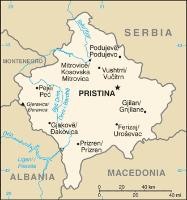Today (June 15) the government of Kosovo will enforce the territory's constitution, which aims to pass authority over the territory from the U.N. to the EU. The U.N. secretary general's attempt last week to square this move with international law creates the potential for institutional conflict, de facto partition and prolonged insecurity over Kosovo's status. The U.N. has administered the territory under resolution 1244 since 1999, when a NATO bombardment drove out Serbian forces brutalizing Kosovo's ethnic Albanian majority. Serbia, with the backing of Russia, a U.N. Security Council member, have since resisted any move towards independence, with most Serbs convinced the region is the spiritual heartland of their nation. On Feb. 17 this year, however, Kosovo's government unilaterally declared independence in the face of fierce opposition from Serbia, again supported by Russia, together with a handful of countries with their own separatist worries. So far the declaration has gained the support of 42 of the U.N.'s 192 members. Notably Croatia, Bulgaria and Albania remain the only Balkan states to offer recognition. On Thursday, U.N. Secretary General Ban Ki-moon sent a letter to Kosovo's President Fatmir Sejdiu setting out the U.N.'s post-constitution plans, sidestepping Russian obstruction in the Security Council. Alluding to independence and the imminent arrival of the constitution, Ban said the U.N. must "adjust to developments and changes on the ground" and "reconfigure the structure and profile" of its presence. It must be one that "corresponds to the evolving situation in Kosovo and that enables the EU to assume an enhanced role." This is "in accordance with resolution 1244," he wrote. Again, in parallel correspondence with Serbian president Boris Tadic, Ban said, "Resolution 1244 continues to be in force until the Security Council decides otherwise."
Kosovo: U.N. Attempts to Make Way for EU, But Discord Remains

